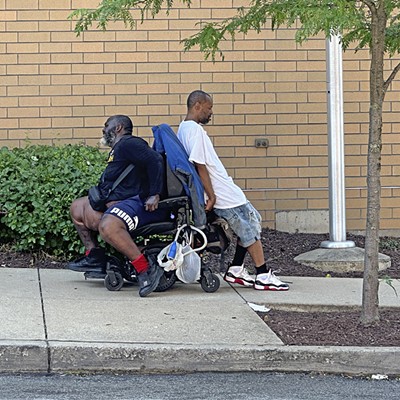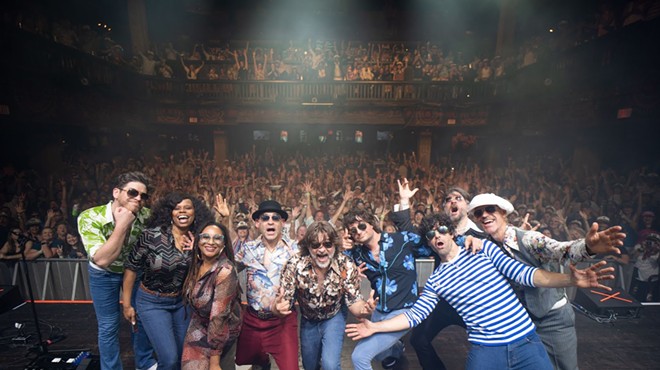Ray of Hope
For gay African-Americans, faith can be a struggle
[
{
"name": "Local Action Unit",
"component": "24929589",
"insertPoint": "3",
"requiredCountToDisplay": "1"
}
]
Raymond Smith is on the run. In the cavernous sanctuary of the Wal-Mart-sized Mt. Ararat Baptist church, he races down from the choir loft, his Twizzler hair locks streaming behind his head. He jukes and weaves among the worshippers, who spill into the aisles to shout praises, wave their arms and dance. He darts between them, overflowing with ecstasy and the inspiration of a supremely delivered word.
Usually, Ray's dash begins just as Pastor William H. Curtis' sermon begins descending from its almost perfectly timed climax. On some Sundays, if the Holy Spirit drives him hard enough, Ray will make his way to the second-floor balcony, gathering speed like he's stealing bases. You can always tell the visiting folks in the pews: They're the ones craning their necks to watch Ray get busy on his laps.
Ray is what many in black and Pentecostal churches call a "runner" ... a worshipper inspired by the Holy Ghost to sprint around the sanctuary. Often as he runs, he shouts, whistles or bangs the tambourine, making joyful noises unto the Lord.
But sometimes it can be hard to see what the 29-year-old is running to ... or from. He has traveled a circuit from Erie to Pittsburgh and back on a spiritual journey. He felt called to return to Erie, where he was born and where his siblings and mother still live. But since going back six months ago, he has bounced from church to church, looking for a spiritual home, one that included the soul-stirring sermons and passionate praise he found at Mt. Ararat. Ray believes he has a discerning spirit, so when he enters sanctuaries he's able to intuit the genuine from the fake. Too often he's run up on fake.
Finally, Smith joined the much smaller Abundant Life Church of Erie, with just about 100 members. It's not a "condemnation" church, Smith says. It's not bent on scourging parishioners with the fear that "you going to hell for x, y and z."
Ray doesn't need to be told why he's in danger of going to hell. He already knows.
"Help me get through it," he pleads.
The problem is, when it comes to Ray's sin, he isn't the only one running around in circles. So are the many churches he should be able to turn to for guidance.
These are the churches Ray hopes to lead people like himself to ... the churches that denounce him for being gay.
"At [age] 6 ... I knew something was different about Raymond," Smith says in his Erie apartment late one Sunday night. "A lot of problems I faced later on as an adult stem from not having anyone pay attention to Ray."
Ray doesn't always refer to himself in third person. But when he does, you sense that someone else is trapped inside him.
Growing up, Smith didn't do what other boys did. He jumped rope and liked gymnastics. He didn't come home and talk about girls and sex, like the other men in his family.
By age 10, he says, he had already been sexually "messed with" by more than one male relative.
Throughout high school, he stayed buried in books, track and field, student government ... everything but girls. Then he came to Pittsburgh for college.
"I started to develop the kind of feelings most kids ... and I thought something was wrong with me here ... that most kids develop at like 15, 16 [years old]," says Smith.
When Ray confessed his sexual orientation to his sister, she told him she already knew. She was just waiting for him to tell her. When he apprehensively came out to his older brother and mother, they both accepted him lovingly. Recently, says Smith, he learned that years before, his stepmother told the family she thought he would be gay when he got older.
Telling his father, however, was something else.
Christmas morning Ray was in the car with his father, on their way to pick up his younger stepbrother. He hadn't planned on using Jesus' birthday to break the news; it was the only private time they had together while Ray was home from school on break. When he disclosed that he was bisexual, his father initially claimed ignorance. Smith explained he liked men, then assured his dad that it was nothing he did that made him that way ...
"He turned and looked at me with this look in his eye and said, 'I know because I didn't raise you to be like that,'" Smith recalls.
There was silence. And then his father said, "You're a disappointment to me."
Smith spent the rest of the drive looking out the window, crying in silence. A few days later, he rode backseat in a speechless two-hour drive back to Pittsburgh. Conversations between the two after that were cold and brief. Five months after Christmas, his father passed away.
"I needed acceptance from this man my entire life, and wasn't sure if I ever got it because he wasn't very emotional," says Smith.
It was the events surrounding his father's death ... including increasing conflict with his stepmother ... that led Smith to counseling with his pastor at Mt. Ararat. The truth about Smith's sexual orientation slipped out to his pastor while he was unpacking problems with his family. Smith says Rev. Curtis told him: "Learn whatever it is that you need to learn through this process. Don't rush it because God wants you to learn certain things out of it." (Rev. Curtis declined comment for the story.)
Growing up, Smith never got much attention at home; he was the middle child among brothers, a sister, stepbrothers and live-in cousins. In church, Smith never has to worry about attention. At Mt. Ararat, he was in the choir and on the praise team, which leads the congregation in worship. Thanks to his sign-language fluency, Smith also stands at the front of the church during services, interpreting sermons for the deaf.
But not all of the attention Ray gets has been positive. After returning to Erie, Smith attended a mega-church, but got frustrated when he felt his business was blasted from the pulpit. During one service, the minister asked the crowd rhetorically how anyone could come "shout up the carpet" and "run around the church" and not be a member.
"OK, everybody knows I shout," says Smith. "Everybody knows I run, and everybody knows I ain't a member. Who else is he talking to?"
His acts of faith draw attention to himself, which eventually draws attention to his self ... his gay self. Smith thought his sexuality would be a problem until he had prayer with his praise team and divulged his sexual struggles. At first he was wary about how they'd respond, but they supported him.
"Everybody was cool and nobody acted like they were shocked," says Tonita Davidson, from Mt. Ararat's praise team who was there for the confession. "We were all like, 'That's cool,' because we all have issues that we're struggling with in our personal lives, but we still wanted him to know that we still loved him very much."
A choir friend told him, "Ray, do you think God would have created you like this for you to hate yourself?"
This made sense to Smith at the time. Maybe he could be both gay and happy in the service of the Lord. Still, there were unanswered questions.
"I'd ask God why is it this person over here only had to struggle with cigarette smoking," says Smith, "but I've been given this?" And why, he wondered, were so many people flocking to him, trusting him with the privileged information of their secret homosexual activities?
Then, during Rev. Curtis' sermon one Sunday, it hit him.
"Pastor said, 'It's gonna take unorthodox people, doing unorthodox things in unorthodox places.'" Instantly Smith envisioned himself ministering at a gay club, though he says he's never been to one.
"I'm scared," to realize this vision, says Smith. "But it's not about me."
Smith now says God has been preparing him for a huge challenge. "He separated me to take me back," says Smith. "He separated me to establish myself, to study his word, to become more knowledgeable ... so that I could go back and witness to people."
His plan is to begin a ministry that reaches out to gay and lesbian people of faith. He doesn't yet exactly know what that ministry will look like, or when he'll bring it to fruition. But he envisions a support group, he says, "not in the sense of 'We support it,' but to help someone who is struggling with it get through it. Something that will be anonymous but available: You can't just go to the church office and say, 'Where's the gay group at?'"
Which is the problem, Smith says. The number of people in church who grapple with homosexuality is "100 times more than we would think." He wouldn't need to have this kind of ministry if churches made it easier to talk about. As things stand, he says, homosexuality is "the big purple elephant in church that everyone know is there, but acts like it's not."
Where he's at with that ministry, however, suggests there's still much room for his development. He says he no longer cares what people think about him anymore, yet declined to be photographed for this story, and was leery about being named in it. He doesn't want to run from who he is any longer. But he can't run toward it either, totally embracing the gay man inside him. Ultimately, he believes, if he wants to be right with God, he'll have to leave that part of himself behind.
Says Smith, "I've run across a lot of people who say, 'God doesn't see anything wrong with me loving someone else [of same gender].' Well, OK, but ... mainstream relationships, you think 'man and woman.' When I think of the Bible, I think man and woman for procreation, and I can only defend [my beliefs] based upon Ray and Ray's life."
Donald Hammonds is that rare black male who is openly gay with his family, his employer, his kids' school systems and his church, and who is supported openly by all. The Pittsburgh Post-Gazette auto critic grew up in a predominantly black St. Louis neighborhood, in a predominantly black church. Living in Pittsburgh the past 23 years, he's gone from the predominantly white Methodist church to the more integrated United Church of Christ, where he's poised to become a minister.
He is openly gay at the Pittsburgh Theological Seminary, where he's studying. He's generally supported by his colleagues and professors there, he says, even by faculty with more conservative views on his sexuality. While he believes homosexuality and Christianity can co-exist, he has sympathy for those who feel it can't. Yet he questions the credentials of ministers who teach them to believe that way.
For gays and lesbians, "That's a very archaic and unhealthy approach to your life," Hammonds says. "You cannot flourish as an individual and feel that way about yourself."
The main institutions that need to understand this, says Hammonds, are African-American churches. Based on his own experiences with various churches, Hammonds feels black churches are definitely more conservative about sex.
"I question if the majority of African-American clergy are ready to deal with homosexuality," says Hammonds. "There have been gay and lesbian members of the African-American church for Lord knows how long. It's not easy to deal with, but it's sad that many of these same people will feel the need to leave their home churches because of lack of acceptance."
As Rashad Burgess, director of the Chicago Department of Health's Men of Color HIV/AIDS Coalition, said in The Advocate in 2002, "It's more complicated and layered than black folks not liking homosexuals. It's more, 'We've got so many strikes against us, and this is one more strike.'"
For Hammonds, this is a common attitude among African Americans, and the reason he gave up looking for support from black communities long ago.
"White churches are the same way except in certain liberal churches," counters Rev. Ozzie Willis of New Light Temple Baptist church, in the Hill District. "White and black churches are the same on this, but white churches seem more flexible because they have one or two more cases made public where they've accepted homosexuality."
As far as Willis is concerned, though, there is no debate about it, especially not a theological debate: "Being gay is a sin, even though God loves the sinner." That is precisely the stance ... equating homosexuality with sin ... that alienates gay Christians, but Willis says he can't help that. "That is the truth, and the truth can't be marginalized or diluted," he says. "I would definitely approach it as a sin, but I would not do it to offend."
Many white ministers see things the same way.
"Anyone can imagine they can do what they want to do and get away with it," says Robert Gagnon, author of The Bible and Homosexual Practice: Texts and Hermeneutics. "But the united testimony of scripture is quite clear about certain boundaries for sexual behavior."
Among the scriptures he cites are such passages as Leviticus 18:22 ("Thou shalt not lie with mankind, as with womankind: it is abomination.") and the infamous Sodom and Gomorrah story. Gagnon also refers to Matthew 16:24: "If anyone would come after me, he must deny himself, take up his cross and follow me."
For homosexuals to truly follow Jesus Christ, he contends, they must deny their sexuality.
Gagnon is white, but believes most African-American pastors share his view. While co-presenting at a workshop on homosexuality with black ministers, Gagnon saw the most outrage when presenters attempted to equate gay rights with black civil rights.
Says Gagnon, "Most African Americans will recoil at the attempt or the analogy to compare their blackness to a sexual impulse, and there's a lot of good reason for that."
As Gagnon sees it, blackness is inheritable, immutable and impervious to cultural change. It's also inherently benign and "primarily non-behavioral." Homosexuality, by contrast, is "not 100 percent inheritable, can be influenced by cultural factors, is not absolutely immutable ... you can lower or higher the intensity of the sexual impulse ... and it's primarily behavioral."
Conservatives have seized on logic like this. During the 2004 presidential election, Republicans used the gay-marriage issue to reach out to black pastors with conservative views on sexual orientation. In Ohio, where a constitutional amendment forbidding gay marriage was on the ballot, that outreach helped deliver enough black voters to win the state ... and the presidency ... for George W. Bush. Elsewhere, black minister Bishop Eddie Long, who leads a 10,000-member-plus church in Georgia, recently led a march from the Martin Luther King Center in Atlanta against gay rights. King's daughter, Bernice, marched at the bishop's side.
Hammonds sighs at such developments. "I don't think the African-American community is in a position to lose the ... gifts of hundreds of thousands of black people simply because they love in a different way than the majority," he says. "But to be honest, that is the way it's going to be for most African-American gays and lesbians until the community learns how to work with people who are different from themselves."
Some are trying already. Standing in stark opposition to the positions espoused by Long and Gagnon is minister Deryck Tines, a locally raised, nationally praised gospel-music director seeking to open a center for gay people of faith.
When ministers cite scripture to denounce homosexuality, Tines says, the verses in question have been taken out of context. The passage in Leviticus, Tines says, was a prohibition on certain ritualistic practices involved in worshipping of idols such as Baal ... not a total repudiation of homosexuality. The Sodom and Gomorrah story, says Tines, was not about gay men gone wild. It was about a certain overzealous class of men who perpetually asserted their dominion over others by pillaging and raping men and women. That is what God was wiping out.
As for Christ's injunction to deny oneself, Tines wonders what's to deny?
"Are we talking about behavior, identity or orientation?" asks Tines. "Sexual desires don't come from some body else, they come from God."
Ministers are the most sexually inhibited people, says Tines, and that comes across in how they preach and study scripture. "If you haven't been through a school to get you through that exegesis of the scripture, then you're lost," he says. "But even those who've been schooled are still fucked up."
Tines, 43, is the son of preachers, and has been preaching since age 12. He's been gay for even longer, he says ... and unlike Smith, he feels no need to compromise his sexuality for the sake of his faith. He's also less traditional than Hammonds, who has a life partner and three kids. Tines has never been married or civil-unionized, and he doesn't care to be. He has no kids. He has a penchant for wild hair designs and colors, fashionably flamboyant dress, big cosmetic jewelry and even bigger sunglasses.
He doesn't care if you're a Christian who's just curious, one who's fully out, or one who believes you can be delivered out of gayness. "I don't care if you want to be gay or if you want to be straight," says Tines. "I support you whether you're gay or you're straight."
He wishes more ministers could say the same. As things stand, he says, it's uncomfortable for gays or lesbians to feel safe and free in the church ... no matter where they are "in the process."
The "biggest struggle" for African-American gays and lesbians, Tines says, "is, 'Where do I fit in? And how do I justify what's going on with me with the people I'm going to be around, or the people in my family?'"
Tines' center, an expanded space from the office he leases on Forbes Avenue, in Uptown, will be called "Sanctuary." He hopes it will become "a safe place for people who feel marginalized by their sexuality in traditional church."
Like Tines, Raymond Smith longs for a place where he can love God freely, alongside other people who love God ... a place where they won't be condemned for who they are. But for Smith the runner, creating such a place is only the first step in a long spiritual race. Somewhere along the way, he hopes to outstrip the sinner he says is inside him.
"In the future I want to be married," he says. "I want to have kids, I want the house, the white picket fence, the cat, the dog.
"I want to have lily-white America."
















